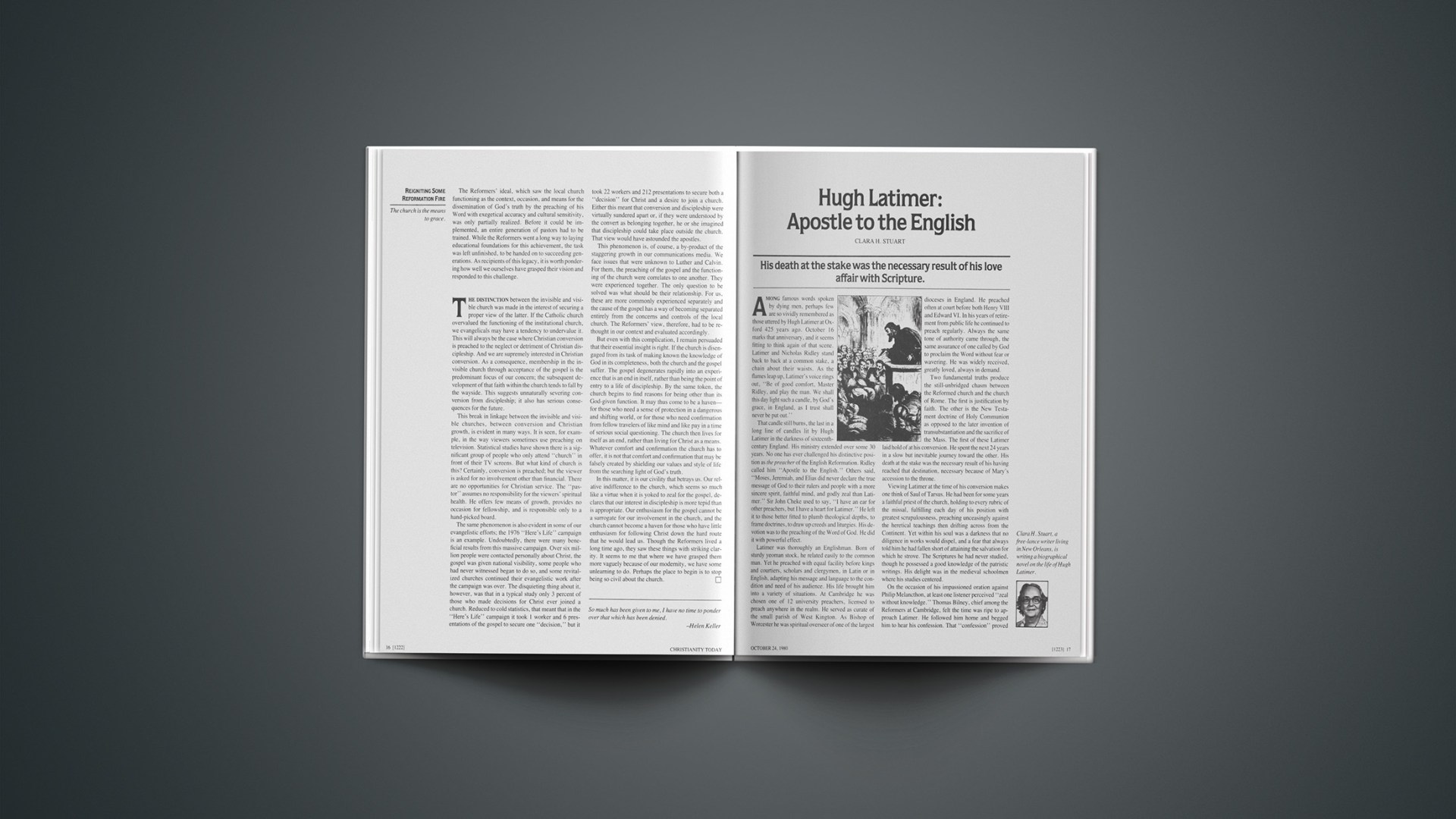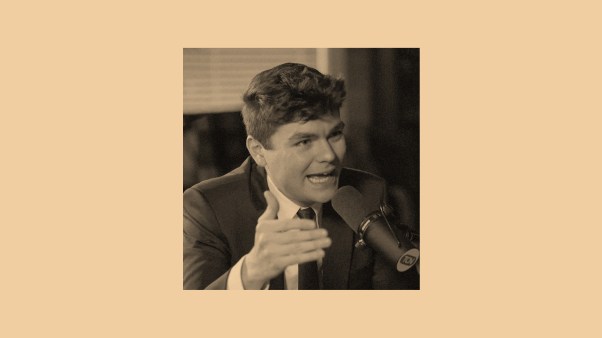His death at the stake was the necessary result of his love affair with Scripture.
Among famous words spoken by dying men, perhaps few are so vividly remembered as those uttered by Hugh Latimer at Oxford 425 years ago. October 16 marks that anniversary, and it seems fitting to think again of that scene. Latimer and Nicholas Ridley stand back to back at a common stake, a chain about their waists. As the flames leap up, Latimer’s voice rings out, “Be of good comfort, Master Ridley, and play the man. We shall this day light such a candle, by God’s grace, in England, as I trust shall never be put out.”
That candle still burns, the last in a long line of candles lit by Hugh Latimer in the darkness of sixteenth-century England. His ministry extended over some 30 years. No one has ever challenged his distinctive position as the preacher of the English Reformation. Ridley called him “Apostle to the English.” Others said. “Moses, Jeremiah, and Elias did never declare the true message of God to their rulers and people with a more sincere spirit, faithful mind, and godly zeal than Latimer.” Sir John Cheke used to say, “I have an ear for other preachers, but I have a heart for Latimer.” He left it to those better fitted to plumb theological depths, to frame doctrines, to draw up creeds and liturgies. His devotion was to the preaching of the Word of God. He did it with powerful effect.
Latimer was thoroughly an Englishman. Born of sturdy yeoman stock, he related easily to the common man. Yet he preached with equal facility before kings and courtiers, scholars and clergymen, in Latin or in English, adapting his message and language to the condition and need of his audience. His life brought him into a variety of situations. At Cambridge he was chosen one of 12 university preachers, licensed to preach anywhere in the realm. He served as curate of the small parish of West Kington. As Bishop of Worcester he was spiritual overseer of one of the largest dioceses in England. He preached often at court before both Henry VIII and Edward VI. In his years of retirement from public life he continued to preach regularly. Always the same tone of authority came through, the same assurance of one called by God to proclaim the Word without fear or wavering. He was widely received, greatly loved, always in demand.
Two fundamental truths produce the still-unbridged chasm between the Reformed church and the church of Rome. The first is justification by faith. The other is the New Testament doctrine of Holy Communion as opposed to the later invention of transubstantiation and the sacrifice of the Mass. The first of these Latimer laid hold of at his conversion. He spent the next 24 years in a slow but inevitable journey toward the other. His death at the stake was the necessary result of his having reached that destination, necessary because of Mary’s accession to the throne.
Viewing Latimer at the time of his conversion makes one think of Saul of Tarsus. He had been for some years a faithful priest of the church, holding to every rubric of the missal, fulfilling each day of his position with greatest scrupulousness, preaching unceasingly against the heretical teachings then drifting across from the Continent. Yet within his soul was a darkness that no diligence in works would dispel, and a fear that always told him he had fallen short of attaining the salvation for which he strove. The Scriptures he had never studied, though he possessed a good knowledge of the patristic writings. His delight was in the medieval schoolmen where his studies centered.
On the occasion of his impassioned oration against Philip Melancthon, at least one listener perceived “zeal without knowledge.” Thomas Bilney, chief among the Reformers at Cambridge, felt the time was ripe to approach Latimer. He followed him home and begged him to hear his confession. That “confession” proved to be Latimer’s undoing. His conversion followed.
He procured a copy of the Scriptures and began to read. Heaven’s light flooded in as he found the Word plainly declaring that on the cross Christ had made full atonement for his sins and obtained for him lasting peace with God. He saw that nothing he could ever do could add to the finished work of Christ. With relief he realized that the laborious system of penance, intercession of saints, invocation of the Virgin, and such ceremonies were entirely unnecessary to obtain salvation.
He joined Bilney and the others behind locked doors at the White Horse Inn, where amazing discussions took place. An entirely new picture of the true Christian life soon filled his view. Christ became his example and the New Testament writings showed him the path. He began to accompany Bilney on his visits to the sick, the poor, the neglected, the prisoner, ministering to the needs of those for whom none cared. They taught the ignorant and sought to lead men to repentance. His hours filled with these new activities, Latimer found “voluntary works,” as he began to call them, slipping into a far less important place. True holiness lay in following Christ and being obedient to his commands rather than in such things as creeping to the cross on Good Friday, decorating images, or offering candles at the shrines of saints.
At this point he had no thought of separation from the communion and teachings of the church. He felt no need for a new creed or different form of worship. He officiated at the altar as before. But his primary emphasis shifted. “God’s instrument of salvation,” he said, “is preaching,” and he quoted Romans 10:14 frequently. “Every one of us must have a special faith,” he said. “I must believe for myself that his blood was shed for me.” Preaching became the passion of his life.
Always he preached the simple message that had been used to open his own eyes: Salvation is by faith alone. Yet he never had any conception of a faith that actually stood alone. “Faith is a noble duchess,” he would say. “She hath ever her gentleman-usher before her—the confessing of sins; she hath a train after—the fruits of good works, the walking in the commandments of God.” He had more concern for sin than for error and considered the Christian life more important than dead orthodoxy. Yet rightness of belief he deemed necessary. And true orthodoxy should without fail issue in right living, while repentance and turning from sin were both a prerequisite and a continuing necessity of both.
He early felt the importance of making the Scriptures freely available in the English language. He dared speak on behalf of this when to do so was dangerous, though not actually heretical. After 10 years of preaching on the subject, along with persuasion from Archbishop of Canterbury Cranmer and pressure from Thomas Cromwell, the desired end came about: the king agreed for the Bible in English to be freely and openly used.
Latimer was exasperatingly slow in changing his theological views. He clung tightly to each doctrine and practice of the Roman church until thoroughly convinced from Scripture of its error. Yet as soon as he made any small change in the direction of the Reformation, his opponents forced him to defend his position. In so doing he was driven again to the Scriptures when he began to find one thing after another on which he must release his hold.
At first he preached only against the abuse of certain practices. Remedy the abuse and give the people the Bible, and all would be well. Praying to saints he permitted, but their worship he forbade. He warned that it was the saints, and not the images, to whom they might pray. Veneration of the Virgin he would allow, but he was incensed over a hymn sung at Bristol wherein she was extolled as salvatrix ac redemptrix. Purgatory existed, but the money spent on masses for the dead might be put to better use in serving the living. But slowly he began to find to be wrong things he had considered allowable but not essential.
Why was he so slow to change? We can only see it as God’s wisdom. In 1531 Bilney perished in the flames as a relapsed heretic. Early the next year Bishop Stokesley made a determined effort to convict Latimer of heresy. He would not have escaped with his life had his convictions led him to deny the truth of matters such as those mentioned. He was not yet ready categorically to deny any of them, but he was no longer accepting them in the generally understood way. Bainham died at this time, partly for his denial of purgatory. These deaths deeply affected Latimer and sent him back to his Bible with a renewed determination to know the truth.
By the time he became bishop of Worcester he realized that much more was involved than abolishing abuses. Too widespread among the clergy was the practice of preying upon the fears and superstitions of the people. Enormous amounts of money poured in at the shrines to which people were urged to go on pilgrimage. Latimer learned of the deceit involved in mechanically driven images that the priest in charge operated, making the image seem to nod her head, weep tears, frown, or appear to speak. He joined in the exposure of such practices and in destroying many such images. He took part in the exposure of the “Blood of Hales,” a vial purporting to contain the blood of Jesus. Merely to look upon it was supposed to guarantee eternal salvation. It proved to be honey, with coloring added to give it the appearance of blood. Thus vanished Latimer’s toleration of prayers to saints. By the time he was preaching before Edward VI he spoke freely of “purgatory pick-purse” in derisive terms. He now declared that, once a person died, he went to heaven or hell. He found no scriptural intimation of any intermediate place.
He spoke against “unpreaching prelates” who were seldom in their dioceses, but spent their time in secular pursuits and luxurious living. Naturally such an example gave no incentive to the parish priest to do his proper work. He referred to pulpits without preachers as bells without clappers. Many a priest spent his time in bead telling, prayers, and processions, with never a sermon.
Latimer denounced moral, social, and judicial ills. But he always preached from the authority of Scripture rather than from his own opinion. His condemnation fell upon bribery and the selling of benefices and public offices. Gambling, prostitution, and drunkenness caught his fury as well. He preached against rent raising and the growing enclosure of common lands, which worked a hardship on those who gained their living from the soil. The misuse of funds and properties from the dissolution of the monasteries grieved him. He felt it wrong to divert property designated for religious purposes to feed the extravagance of the court. He wanted to see a few of these houses in each county cleansed of abuses and endowed to sacred uses of piety and hospitality and for the religious education of youth.
At the time of the Six Articles in 1539 Latimer displeased Henry VIII by resigning his bishopric. The king silenced him for the last eight years of his reign, and even imprisoned him for part of that time. The years were not wasted, but Latimer must have chafed at the restraint. He was again free to preach when Edward VI became king and his voice rang out as before. Yet a new depth and richness marked his preaching.
Doubtless he gave much time to studying the Scriptures during those silent years. He must have pondered deeply the question of the Mass. He seemed now more ready to listen and to discuss the matter. Cranmer had invited several Reformers over from the Continent, and Latimer spent long hours in conversation with them. In 1548 he took the final step and reached the end of his long journey. He was sure of his ground and ready to proclaim clearly his understanding of the New Testament teaching on the sacrament of the Lord’s Supper. This was the doctrine for which he would die.
Nearly five years of fruitful ministry passed before the death of the young king and the accession of Mary to the throne in 1553. He must have known what would follow. Within two months he was in the Tower. Plans for the trials to take place at Oxford brought about his transfer there.
Ill health and old age, added to the months of isolation and hardship of prison, weakened him physically. Even his memory began to fail him. Yet his faith stood firm, evidenced by his words in answer to the questions at the trial:
As to the doctrine of the real presence: “I do not deny, my lord, that in the sacrament by spirit and grace, is the very body and blood of Christ; because that every man, by receiving bodily that bread and wine, spiritually receiveth the body and blood of Christ, and is made partaker thereby of the merits of Christ’s passion. But I deny that the body and blood of Christ is in such sort in the sacrament as you would have it.”
Concerning transubstantiation: “There is, my lord, a change in the bread and wine, and such a change as no power but omnipotency of God can make, in that that which before was bread should now have the dignity to exhibit Christ’s body; and yet the bread is still bread, and the wine still wine. For the change is not in the nature but in the dignity; because now that which was common bread hath the dignity to exhibit Christ’s body; for whereas it was common bread, it is now no more common bread, neither ought it to be so taken, but as holy bread sanctified by God’s Word.”
On the propitiatory sacrifice of the Mass: “No, no, my lord: Christ made one perfect sacrifice for all the whole world; neither can any man offer him again, neither can the priest offer up Christ again for the sins of men, which he took away by offering himself once for all, as Saint Paul saith, upon the cross; neither is there propitiation for our sins, saving his cross only.”
There was never any doubt as to the outcome. He was condemned as a heretic, ordered to be degraded of all ecclesiastical orders, declared no member of the church, excommunicated with the great excommunication, and committed to the secular powers to receive his punishment.
We burn no heretics today. Instead of too many guidelines there often seem to be none. Spiritual darkness is as deep now as then. Social and moral evils grow even worse in our permissive age. The things for which Latimer stood could be relevant still. Today’s preachers may find light from the candles he lit over four centuries ago:
• The candle of devotion to the Scriptures, by which every belief and practice is tested.
• The candle of certainty that justification is by faith in Christ and his finished work on the cross.
• The candle of insistence on holiness of life, accepting no compromise with sin.
• The candle of faithfulness in preaching the Word as primary responsibility.
• The candle of compassion for one’s fellow men and the willingness to labor in their behalf.
• The candle of fearlessness in speaking out against the evils of the day, wherever found, in places high and low.
• The candle of an exemplary personal life, against which the sternest critics can find little to speak.
• The candle of courage in standing for the truth, at whatever cost, be it opposition, imprisonment, or death.
Carl F. H. Henry, first editor of Christianity Today, is lecturer at large for World Vision International. An author of many books, he lives in Arlington, Virginia.










